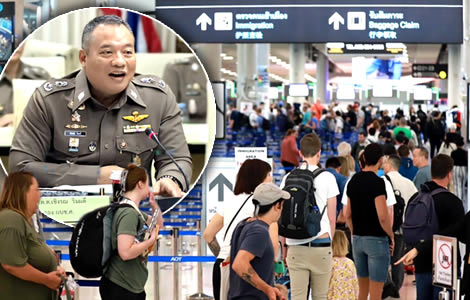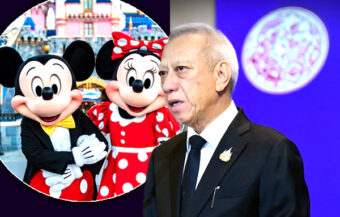Thailand’s Immigration Bureau denied claims it targets Chinese and Russian tourists, saying new checks focus on visa-run abuses and illicit businesses, while assuring genuine visitors are unaffected as authorities tighten border inspections nationwide.
A top Immigration Bureau spokesman on Monday clarified the ongoing crackdown on visa-on-arrival abuses and a new regime introduced to counter illegal activity tied to grey capital and scammer gangs. Pol. Maj. Gen. Choengron Rimphadee singled out a rumour campaign by visa-run agencies claiming the effort targets Chinese, Russian and other Asian visitors. He said the claim is false. He assured genuine tourists that the new rules will not affect them. He said the real targets are foreigners running illicit businesses in Thailand and operating outside licensing and tax systems, grey-capital networks that distort and undermine the Thai economy.

Thailand’s Immigration Bureau has intensified inspections at airports and land borders as it targets foreigners who exploit visa-exemption rules. The bureau says the campaign focuses on repeated short-term entries that mimic long-term stays.
It also rejects claims that the measures will hurt tourism or single out specific countries. The announcement came Monday at Suvarnabhumi Airport and included new details on enforcement, workload and travel patterns.
Pol. Maj. Gen. Choengron Rimphadee, the bureau’s spokesperson, said officers now apply tighter scrutiny at land and air checkpoints. He said the checks aim at travellers who enter Thailand many times in short succession.
Visa run operators spread false claims as immigration exposes repeat-entry abuse of visa exemptions
Moreover, he said operators behind “visa-run” services have spread false claims online to protect their business. These operators warn that Thailand will restrict visitors from China, Singapore, South Korea and Russia. However, Choengron said the warnings are false and designed to stir fear among travellers who rely on quick exits and re-entries.
He said the measures target conduct, not nationality. Additionally, he said immigration has found cases involving repeated stays that exceed 200 days in one year. Some foreigners entered more than seven times under the visa-exemption rules.
Many left the country only briefly before returning to restart another 30- to 90-day period. He said these patterns fall outside normal travel behaviour and undermine the purpose of visa waivers.
“These individuals are not coming to Thailand for tourism,” Choengron said. He said many work illegally or run businesses without proper licenses. Others, he said, use Thai nominees to operate companies that leave no labour or tax records.
Security risks grow as call-centre gangs exploit visa runs to shift illicit operations into Thailand
As a result, immigration encounters gaps in oversight that complicate commercial and workforce monitoring. He said the tighter checks aim to correct those gaps and match the border controls used in many countries.
Authorities also cite security threats when explaining the policy. Recently displaced call-centre gangs from neighbouring countries have tried to shift operations to Thailand. Several arrested suspects showed long chains of visa-run entries.
Furthermore, officers say quick in-and-out patterns allow criminal groups to move quietly. The new measures, they say, give immigration a chance to deny entry before such groups settle inside the country.
Choengron dismissed claims that immigration will target tourists from 16 specific countries, especially China. Instead, he said the rules apply to any traveller who enters more than twice in a row for at least 45 days each time.
Immigration screens irregular travel patterns as arrivals surge and airports face heavier seasonal loads
Officers will review entry history and examine travel plans. They will also verify hotel bookings and return flights. If doubts remain, officers may issue a denial of entry. Those denied will be sent back and advised to obtain the correct visa before returning.
He said the checks will help officials distinguish tourists from long-term stayers who avoid proper applications. Most tourists, he said, stay around 15 days. They hold clear itineraries and follow normal movement patterns. Consequently, they face no additional hurdles. He said the measures protect legitimate travel and streamline screening.
Tourism numbers remain strong despite concerns promoted online. Foreign arrivals, especially from China and India, increased in November. Airports recorded an average of 115,000 arrivals each day. Suvarnabhumi Airport handled about 73,000 passengers daily.
Don Mueang and Phuket followed at lower volumes. During peak hours, wait times reached about 40 minutes. However, automated lanes will soon include visa holders. Immigration expects the expansion by year-end to reduce congestion and move irregular cases to staffed counters.
Officials defend stricter border rules as automation expands to ease queues while curbing visa abuse
Immigration Commissioner Pol. Lt. Gen. Phanumat Boonyalak backed the policy. He said Thailand needs controls aligned with international standards. He said border checks must balance openness with proper supervision. He also said repeated irregular entries raise clear management issues.
Choengron added that border laxity carries risks. “If we focus solely on convenience and boosting headline tourist numbers without proper scrutiny, Thailand will face national security risks and criticism for becoming a haven for foreigners staying illegally,” he said.
His comments emphasised the bureau’s resolve to combine faster processing with stronger filtering.
Nevertheless, immigration leaders say the approach will not hinder normal travel. They argue that visa-free schemes depend on predictable usage. Travellers who enter and exit many times disrupt that system. Therefore, the bureau will maintain a close watch on patterns at major checkpoints. Officers will also work with airlines to identify travellers who may require interviews before landing.
Immigration moves to close visa-run loopholes as checks tighten at remote border posts and abuses persist
The bureau says consistent rules create fair treatment for all travellers. Officials say travellers who follow standard patterns pass smoothly. They also say recent online warnings exaggerate the scope of the measures. Many claims, they say, come from operators who profit by moving clients across borders without proper visas.
The Immigration Bureau expects arrivals to rise through the high season. Airlines continue adding routes. Airports report stronger flows from China, India and South Korea.
Despite busier terminals, officials insist checks will remain strict. They also say increased automation will reduce queues for regular travellers while preserving scrutiny for irregular cases.
The push includes both airport and land borders. Officers at remote crossings have been told to document unusual patterns more carefully. Some crossings, they say, have recorded the same travellers returning within hours. These travellers often carry light luggage and provide vague details about accommodation. Such cases, the bureau says, illustrate misuse of the scheme.
Enforcement targets long-term stayers, avoiding permits as police pursue tighter control of rogue foreigners
Officials also note that many long-term stayers avoid official permit procedures by hopping across nearby borders. These travellers then remain in Thailand without registration. As a result, authorities lack labour records, business filings or tax data. The crackdown, they say, addresses this gap by stopping the cycle of repeated visa-exempt entries.
Throughout the rollout, immigration leaders maintain that legitimate visitors have nothing to fear. They emphasise that officers rely on patterns, documentation and interviews.
Immigration Bureau tightens rules for foreign tourist visas as the country feels the heat on scammers
UK couple’s honeymoon holiday to Thailand halted by Immigration officials over smudged visa stamp
They also say the bureau will continue upgrading systems to manage rising volumes while tightening enforcement. In their view, clear screening and predictable rules help maintain order at borders that now handle more than 100,000 arrivals each day.
The campaign will continue as officers monitor new entry patterns. Immigration says the enforcement aims to preserve the integrity of visa-exemption policies and ensure proper management of those who remain in Thailand for extended periods without formal approval.
Join the Thai News forum, follow Thai Examiner on Facebook here
Receive all our stories as they come out on Telegram here
Follow Thai Examiner here
Further reading:
Crackdown on expats working illegally deepens. Italian on Koh Phangan is arrested for woodwork
Crackdown aimed at upending foreign business trade moves from Koh Phangan to Phuket. Four arrested
Crackdown to wipe out foreign business abuses and ownership on Koh Phangan & Koh Samui intensifies
Arrogant Lebanese man held on Koh Phangan for illegal bike rental racket after being deported before


















